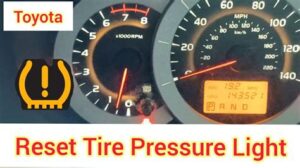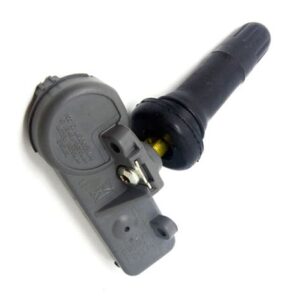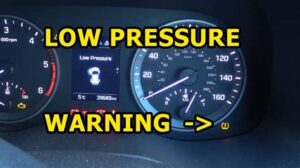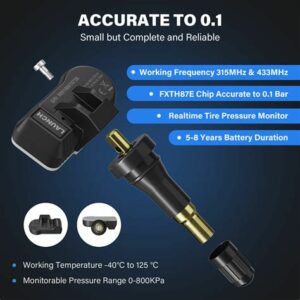Discover Denso tire pressure sensors: their importance, functionality, benefits, and tips for choosing the right one for your vehicle. Ensure optimal safety and performance!Maintaining optimal tire pressure is essential for vehicle safety and performance, making tire pressure sensors a crucial component of modern automotive technology. Among the various options available, Denso tire pressure sensors stand out for their reliability and precision. In this blog post, we will explore the intricacies of Denso tire pressure sensors, starting with an introduction to what they are and their significance in ensuring optimal tire health. We will delve into how these sensors function, the benefits they offer, and tips for selecting the right Denso sensor tailored to your vehicle’s needs. Whether you’re a seasoned driver or a new car owner, understanding tire pressure sensors can enhance your driving experience and extend the life of your tires. Let’s navigate through the world of Denso tire pressure sensors together!
What is Denso tire pressure sensor?
The Denso tire pressure sensor is a vital component of a vehicle’s tire pressure monitoring system (TPMS). Designed to monitor the air pressure within tires, these sensors help ensure optimal performance and safety on the road.
Manufactured by Denso, a leading automotive parts supplier, these sensors provide real-time data to the driver, helping to detect under-inflation or over-inflation of tires. This is crucial not only for maintaining the vehicle’s efficiency but also for enhancing overall driving safety.
A Denso tire pressure sensor typically comprises several key components:
- Pressure Sensor: This component measures the air pressure inside the tire.
- Temperature Sensor: It monitors the temperature of the tire, which can affect pressure readings.
- Transmitter: This sends the sensor data to the vehicle’s onboard computer.
By continuously monitoring these parameters, Denso tire pressure sensors help identify any irregularities that might affect tire performance, such as:
- Low air pressure, which can lead to poor fuel efficiency and increased tire wear.
- Excessive pressure, increasing the risk of tire blowouts.
- Variances in temperature which can impact tire durability.
In summary, the Denso tire pressure sensor plays a crucial role in maintaining tire health, ensuring better vehicle control, and promoting safe driving practices.
The importance of tire pressure sensors
Tire pressure sensors play a crucial role in the safety and efficiency of your vehicle. These sensors continuously monitor the air pressure in each tire, ensuring that they are properly inflated at all times. Proper tire pressure is essential for a variety of reasons:
- Enhanced Safety: Under-inflated tires can lead to blowouts, while over-inflated tires can affect vehicle handling. Accurate tire pressure reduces the risk of accidents.
- Improved Fuel Efficiency: Maintaining the correct tire pressure can improve your vehicle’s fuel efficiency. Tires with low pressure create more rolling resistance, leading to increased fuel consumption.
- Longer Tire Life: Properly inflated tires wear more evenly and last longer. This can save you money in the long run by reducing the frequency of tire replacements.
- Better Vehicle Performance: Correct tire pressure ensures optimum handling and braking performance, contributing to an overall better driving experience.
Additionally, many modern vehicles are equipped with a Tire Pressure Monitoring System (TPMS) that alerts drivers when tire pressure is too low. This technological advancement is particularly important in preventing potential tire failures on the road.
Overall, the importance of tire pressure sensors cannot be overstated. They not only enhance safety and performance but also provide economic benefits, demonstrating their vital role in automotive technology.
How Denso sensors work
The Denso tire pressure sensor is a crucial component that plays an essential role in vehicle safety and performance. Understanding how these sensors function can help vehicle owners appreciate their significance. Here’s a breakdown of how Denso sensors work:
1. Basic Operation
The Denso tire pressure sensors use pressure transducers to monitor the air pressure within the tires. Here’s a typical process of how these sensors operate:
- Pressure Measurement: The sensor continuously monitors tire pressure, capturing real-time data.
- Signal Transmission: When the tire pressure deviates from the norm, the sensor sends a wireless signal to the vehicle’s ECU (Electronic Control Unit).
- Dashboard Notification: If the pressure is too low or high, the ECU triggers the vehicle’s dashboard warning light to alert the driver.
2. Sensors Components
The internal mechanisms of a Denso tire pressure sensor consist of several components that work together:
| Component | Function |
|---|---|
| Pressure Sensor | Measures the air pressure inside the tire. |
| Microcontroller | Processes the pressure data and manages the sensor’s communication. |
| Battery | Provides power to the sensor for operation and communication. |
| Communication Module | Sends tire pressure data to the vehicle’s ECU. |
3. Technology Used
The Denso tire pressure sensors utilize advanced technology for accurate monitoring:
RFID Technology: Many sensors incorporate Radio Frequency Identification (RFID) technology for efficient communication, enabling them to send and receive signals over a distance without wiring.
4. Calibration and Maintenance
To ensure precise functionality, Denso sensors are designed with a calibration mechanism to adapt to changing conditions:
- Self-Calibration: These sensors can recalibrate themselves to maintain accuracy when external conditions change.
- Battery Check: It’s essential to monitor the battery life of the sensors, as a low battery may affect their operation.
Overall, the functionality of Denso tire pressure sensors is a blend of accurate measurement, effective communication, and user-friendly alert systems, making them a vital investment for any vehicle owner concerned with safety and performance.
Benefits of using Denso tire pressure sensors
When it comes to maintaining vehicle safety and performance, Denso tire pressure sensors play a crucial role. These sensors are designed to monitor and provide real-time data on tire pressure, ensuring that drivers can maintain optimal tire conditions. Let’s explore the various benefits of using Denso tire pressure sensors.
- Enhanced Safety: Proper tire pressure is vital for vehicle safety. Under-inflated tires can lead to blowouts and accidents. Denso sensors provide accurate pressure readings, ensuring that you can address any issues before they become dangerous.
- Improved Fuel Efficiency: Maintaining correct tire pressure can enhance fuel efficiency. According to studies, properly inflated tires can improve fuel economy by 3-4%. By using Denso tire pressure sensors, drivers can ensure optimal inflation levels and save on fuel costs.
- Extended Tire Life: Tires wear more evenly and last longer when they are properly inflated. Denso sensors help monitor tire pressure, reducing premature wear and extending the lifespan of your tires.
- Convenience and Peace of Mind: With Denso tire pressure sensors, drivers receive real-time alerts on tire conditions, providing peace of mind. You’ll never have to guess if your tires are inflated correctly.
- Cost Savings: Investing in Denso tire pressure sensors can lead to significant long-term savings. With better fuel efficiency and extended tire life, the initial investment is often offset by reduced maintenance and fuel costs.
In summary, the benefits of using Denso tire pressure sensors extend beyond mere convenience. They enhance safety, improve fuel efficiency, and save you money in the long run. With their reliable technology, Denso sensors are an excellent addition to any vehicle.
Choosing the right Denso sensor for your vehicle
When it comes to ensuring your vehicle’s tire safety and performance, selecting the appropriate Denso tire pressure sensor is crucial. With a plethora of options available, understanding the key factors to consider can help you make an informed decision.
Factors to Consider
- Vehicle Compatibility: It’s essential to choose a Denso sensor that is compatible with your vehicle’s make and model. Check your vehicle’s owner manual or consult with a professional to confirm compatibility.
- Type of Sensor: Denso offers various types of pressure sensors, including direct and indirect tire pressure monitoring systems (TPMS). Direct sensors measure actual tire pressure, while indirect sensors utilize data from the vehicle’s speed sensors to estimate tire pressure.
- Pressure Range: Ensure the sensor you select has an appropriate pressure range suitable for your tires. Different vehicles and tire sizes may require varying pressure values.
- Ease of Installation: Consider whether the sensor is easy to install yourself or if you need professional assistance. Some sensors come with detailed instructions, making DIY installations more manageable.
- Durability and Reliability: Look for sensors that are known for their durability and reliability, as they will provide accurate readings and require fewer replacements over time.
How to Find the Right Denso Sensor
Here are some tips for finding the right Denso tire pressure sensor:
- Research the specific model of your vehicle to identify the required sensor.
- Consult with automotive professionals for recommendations based on your vehicle’s unique needs.
- Read user reviews and product comparisons to gain insight into the reliability and performance of different Denso sensors.
Conclusion
Selecting the right Denso tire pressure sensor ensures optimal tire performance, improved fuel efficiency, and enhanced safety on the road. Taking the time to do your research will pay off in the long run, keeping you and your passengers secure.
Frequently Asked Questions
What is a Denso tire pressure sensor?
A Denso tire pressure sensor is a device that monitors the air pressure in a vehicle’s tires and communicates this data to the car’s onboard computer system.
How does the Denso tire pressure sensor work?
The sensor uses a pressure-sensitive element to measure tire pressure and transmits this information wirelessly to the vehicle’s dashboard display.
Why is it important to have a functioning tire pressure sensor?
A functioning tire pressure sensor is crucial for ensuring optimal tire pressure, which enhances vehicle safety, improves fuel efficiency, and extends tire lifespan.
What are common symptoms of a faulty Denso tire pressure sensor?
Common symptoms include a constant tire pressure warning light on the dashboard, inaccurate pressure readings, or the sensor failing to communicate with the vehicle’s computer.
How can I maintain my Denso tire pressure sensor?
To maintain your Denso tire pressure sensor, regularly check tire pressure, inspect the sensor for damage, and ensure the battery is charged if applicable.
Can I replace a Denso tire pressure sensor myself?
Yes, replacing a Denso tire pressure sensor can be done by a knowledgeable DIYer, but it’s important to follow the manufacturer’s instructions and ensure proper reprogramming.
Where can I purchase a Denso tire pressure sensor?
Denso tire pressure sensors can be purchased at automotive parts stores, through online retailers, or directly from Denso’s official website.





